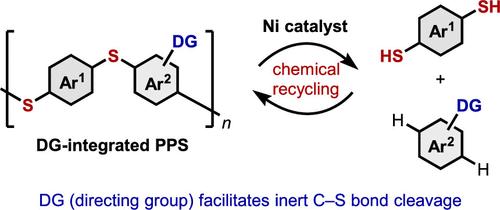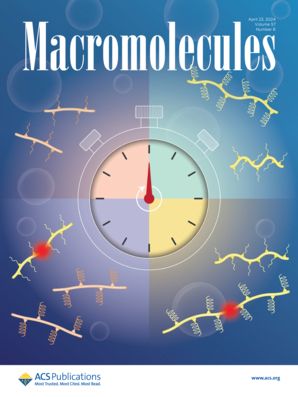定向基团集成聚苯硫醚:实现化学稳定性和可降解性控制
IF 5.2
1区 化学
Q1 POLYMER SCIENCE
引用次数: 0
摘要
塑料的可持续性需要催化技术将聚合物分解成单体或其前体。我们在此报道了通过镍催化的位点选择性C-S键裂解转化为单体前驱体的基团集成聚(苯基硫化物)s。这些聚合物具有优异的化学和热稳定性。聚合物的结晶度可以通过定向基团的设计来调节。本文章由计算机程序翻译,如有差异,请以英文原文为准。

Directing Group-Integrated Poly(phenylene sulfide): Achieving Chemical Stability and Controlled Degradability
Plastic sustainability necessitates catalytic technologies for disassembling polymers into monomers or their precursors. We report herein directing group-integrated poly(phenylene sulfide)s, which can be converted into monomer precursors via nickel-catalyzed site-selective C–S bond cleavage. These polymers exhibit excellent chemical and thermal stability. The crystallinity of the polymers is tunable by the design of the directing group.
求助全文
通过发布文献求助,成功后即可免费获取论文全文。
去求助
来源期刊

Macromolecules
工程技术-高分子科学
CiteScore
9.30
自引率
16.40%
发文量
942
审稿时长
2 months
期刊介绍:
Macromolecules publishes original, fundamental, and impactful research on all aspects of polymer science. Topics of interest include synthesis (e.g., controlled polymerizations, polymerization catalysis, post polymerization modification, new monomer structures and polymer architectures, and polymerization mechanisms/kinetics analysis); phase behavior, thermodynamics, dynamic, and ordering/disordering phenomena (e.g., self-assembly, gelation, crystallization, solution/melt/solid-state characteristics); structure and properties (e.g., mechanical and rheological properties, surface/interfacial characteristics, electronic and transport properties); new state of the art characterization (e.g., spectroscopy, scattering, microscopy, rheology), simulation (e.g., Monte Carlo, molecular dynamics, multi-scale/coarse-grained modeling), and theoretical methods. Renewable/sustainable polymers, polymer networks, responsive polymers, electro-, magneto- and opto-active macromolecules, inorganic polymers, charge-transporting polymers (ion-containing, semiconducting, and conducting), nanostructured polymers, and polymer composites are also of interest. Typical papers published in Macromolecules showcase important and innovative concepts, experimental methods/observations, and theoretical/computational approaches that demonstrate a fundamental advance in the understanding of polymers.
 求助内容:
求助内容: 应助结果提醒方式:
应助结果提醒方式:


